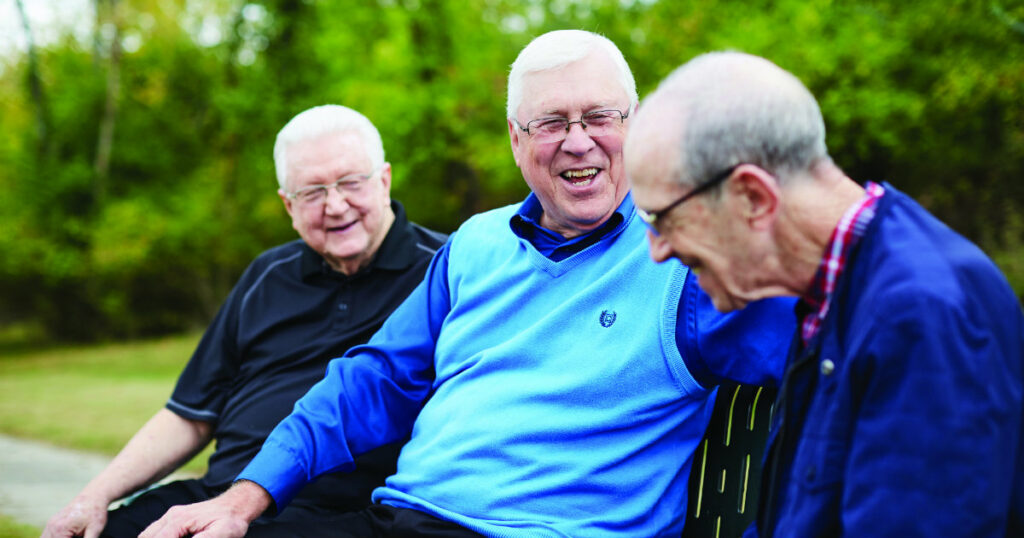Editor’s Note: Throughout the month of June, The Lutheran Witness will be sharing print articles from the past few years on topics of marriage, family and sexuality. Check back for more content each week in June, and view these and other articles here.
By Scott Stiegemeyer
Perhaps someone you know or someone in your child’s school has come out recently as transgender. School districts, government leaders, doctors, counselors and ubiquitous popular media are teaching us all, including many in the church, false and unhealthy ideas about what it means to be human.
The church must not avoid talking about these uncomfortable topics. Too much is at stake. We need to understand what Scripture teaches on human nature, male and female, created in the image and likeness of God, fallen and redeemed. We need to understand the radical effects of the fall into sin and the even more radical benefits of Christ. Transgender issues have grown dramatically in the public’s awareness in the past 10 years, so the church must understand its calling to correct, teach, restore and heal in the name of Jesus Christ.
Holy Scripture describes the creation of human beings as male and female in the context of saying we are made in the image of God. The sexed nature of our bodies is not oppressive. It is marvelous because God reveals the self-giving nature of His love even in our bodies. The whole Bible portrays the bond of marriage between a man and a woman as a representation of the relationship between God and Israel or Christ and the church. When a man and woman give themselves wholly to the other and joyously receive their mate, it is a living picture of who God is. Anything the devil can do to distort that reflection, he will do. The meaning of sex and sexual ethics, thus, are not secondary aspects of the church’s message and mission but point concretely to Christ and His bride.
Learning how to speak
Do you know how to distinguish and use terms like sex, gender, transgender or non-binary? It can be frustrating to learn new expressions or discover that familiar words about biology are being used in new ways.
The sexual glossary expands and changes rather frequently. In the past, we used the words “sex” and “gender” interchangeably. Nowadays, many people make a distinction between them. “Sex” refers to your reproductive organs and other physical traits that mark you as male or female. “Gender” refers to how you feel about yourself and how you wish to be viewed by others. The presupposition at work here separates one’s gender from biology.
Though most people are at peace with being male or female, some, for reasons that are poorly understood, experience discomfort or distress with their sex or gender. Sometimes people describe feeling like they have the wrong body. When this feeling is especially strong and persists over time, it may be diagnosed as gender dysphoria. Think of dysphoria as the opposite of euphoria; dysphoria is intense unhappiness.
Another term, “transgender,” is an umbrella term referring to anyone who strongly identifies with the other gender or feels ill at ease with their own biological sex. In order to alleviate their dysphoria, transgender people might try less invasive activities like cross-dressing or adopting a name typical of the opposite sex.[1]Eventually, they might seek medical intervention if the less drastic measures fail to help. Hormone treatments and a range of surgeries may offer to help them feel more at peace in their bodies. Taking steps to identify as the other sex is called transitioning.
Many assume transgenderism is simply a variation of homosexuality, that a man wants to become a woman because he is sexually attracted to men. But this is not necessarily the case. Heterosexual men who wish to be women do not necessarily stop liking women and vice versa. Likewise, people may experience same-sex attraction without expressing dissatisfaction with their bodies or the desire to be the opposite sex.
The Christian message
First, Christians confess that God is our Creator. Martin Luther wrote in the Small Catechism (SC): “I believe that God has made me and all creatures; that He has given me my body and soul, eyes, ears, and all my members, my reason and all my senses, and still takes care of them” (SC, First Article). Everything proclaims the glory of God from the tiniest atom to the farthest galaxy. Our bodies, too, speak volumes about their Maker.
Still, something has gone terribly wrong. When God created the universe, it was perfect in every way, but our world now is anything but perfect. The whole of creation is in bondage, including the human body, so we can fall into the trap of loathing our physical form and hoping to somehow transcend our biology. Transitioning one’s biological programming is an attempt to transcend that biology.
From the earliest days of Christianity, the church has contended against ideas that there is something inherently wrong with the human body and that salvation entails being set free from it. Current trends in sexual ethics encourage people to find their identity by transcending their physical flesh. This encourages people to deny God’s good creation of their bodies. Indeed, the goodness of the human body was definitively confirmed by the incarnation of the Son of God. It is contrary to the Gospel to claim that the immaterial soul is one’s real identity while the body is just the earthly vehicle we ride until we get to heaven.
The Christian ministry
There are two equal and opposite errors the church must avoid in ministering to transgender people. The first is repulsion, and the second is affirmation. Conservative Christians often react with repulsion and anger to transgender activism and transgender people because the things they say and do so obviously contradict nature. Theologically liberal churches, on the other hand, rally uncritically around the transgender movement in the name of social justice. Neither course of action is justified nor beneficial.
The confessional Lutheran church does not affirm transitioning away from one’s birth sex, nor can it faithfully bring Christ to our neighbor when we are filled with disgust for the person we seek to serve. Moral outrage has its place but is certainly not the only thing the church has to offer. If someone you know suffers from gender identity confusion, love him. Show him the kind of mercy that God has shown all of us in Christ. Love does not mean uncritically affirming everything someone says or does; love “rejoices with the truth” (1 Cor.13:6). It is also “patient and kind” (1 Cor.13:4).
All human beings are distorted by Adam’s sin. We cannot even take the first step to climb out of the pit of our sin. We cannot free ourselves. Only death and rebirth will do. But not all human beings suffer the effects of their fallen condition in the same way. It is a mystery why some people carry certain burdens that others do not.
An inability to mercifully serve our transgender neighbor could be based upon an anemic doctrine of sin. And an anemic understanding of sin leads to an anemic savior. Christian ministry does not diminish one person’s burdens by telling him they do not exist or that they can be fixed by simply trying harder. Christian ministry does not demystify suffering but bears one another’s burdens and frees them from that burden through proclaiming the victory of Christ by word and by deed.
Furthermore, Christians should not assume that having faith in Christ will mean experiences of gender dysphoria will go away. Rather, people who know and love our Lord Jesus continue to struggle against all kinds of sins that have simply not resolved as a result of their belief in Christ and might not resolve this side of the resurrection.
Without question, Christian ministry entails rebuke and correction. Insofar as people delude themselves, embrace the lies of the world and reject the intentions of their Creator, they need to be admonished and invited to Confession and Absolution. Righteousness is not reducible to behavior modification. Nor is transformation merely a matter of being well-informed on what the Bible says about gender or any other topic. We need to be re-created and that is precisely the work of Jesus Christ.
The church’s ministry also acknowledges that our infirmities are rooted in our fallen nature; in fact, due to sin, the entire world as it exists today is not as God created it. Death claims to have mastery over us. This certainly appears to be true. Our own minds betray us; our own bodies betray us. To this, we proclaim that Christ shares His victory over sin and death with all who belong to Him, to all who are joined to Him by Baptism, and that the redemption of our bodies will be fulfilled on the Last Day.
All things new
The Gospel message, which sets us free from sin and death, will cause us to see ourselves more accurately as the temple of God’s presence. But this clarity will be incomplete until the end. As St. Paul says, now we see “in a mirror dimly, but then face to face” (1 Cor. 13:12). In God’s new creation, inaugurated in the life, death and resurrection of Jesus, men and women are being restored, perfected and glorified. Jesus says, “Behold, I am making all things new” (Rev. 21:5). This newness is something that belongs to us right now, though you and I will not experience the full benefit of it until Christ comes again. A day is coming soon when all our infirmities of body, mind and spirit will be extinguished forever.
[1] Not all who cross-dress have gender dysphoria. They may do so for sexual titillation rather than because they want to become the other sex.
This article originally appeared in the January 2021 issue of The Lutheran Witness.
For more resources on marriage and the family, visit the LCMS Family Ministry page.






Without getting into the psychological weeds of dysphoria, the root causes of homosexuality, and the disturbing trends in transgenderism, it seems we spend too much time trying to study the subject of sin. Sure, pray for those caught in these behaviors, but sinful choices abound in many areas besides sexual behavior. The key elements are rebellion and pride, the driving motivations. America has become a pagan culture, and Christians here must be tough, resolved, of a sound mind, and boldly declare the word of God, speaking the truth in love….not passive love, weak love, tepid love, but tough love. A generation of youth are growing up in a conflicted society, unmoored, unstable, confused. We owe it to them to be forthright, honest, and unrelenting in defense of God’s word on sexuality and other issues.